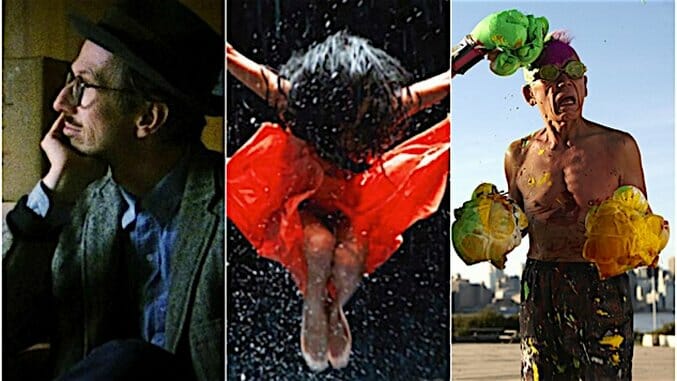7 Illuminating Documentaries about Artists

While it’s a nice, egalitarian notion that anyone can be an artist, it’s hard to ignore that some people seem more qualified than others. And driven. Whether due to hard work, sustained passion, the ability to manifest inspiration or a combination of all three things, some artists stand out even among their brethren. While there are plenty of fictional films purporting to present realistic views of the lives of artists, it’s hard to beat the documentary for eye-opening insights into the thoughts and processes employed by those of a particularly artistic bent. Here are seven such documentaries.
1. Exit through the Gift Shop (2010)

The premise of Exit Through the Gift Shop takes a bit of explaining, but it’s worth it (and doesn’t spoil the viewing experience at all). Thierry Guetta is a pudgy, mutton-chopped Frenchman living in Los Angeles, obsessively filming nearly everything he does. As he begins documenting graffiti and street artists, he meets artist Shepherd Fairey, and through Fairey he meets Banksy, the Babe Ruth qua Deep Throat of the street art world, eventually convincing him to approve a documentary based on his legendary work. But the source tapes of Guetta’s film are soon lost in the sea of unlabeled and unfiled tapes of his life; when he eventually submits an unwatchable mess to his subject, Banksy seizes the camera and tells him he has to now go out and make art of his own, becoming the new subject of the documentary. Against all odds, Mr. Brainwash, as Guetta christens himself, puts on the largest and most profitable street art exhibition in history.
Those are the bare bones of the story, and it’s a fascinating enough narrative on its face. But there’s so much more to Exit Through the Gift Shop. It’s delightful to watch the hyper-reclusive Banksy actually give commentary on film’s events, albeit in almost total silhouette and with a disguised voice. (His commentary is very, very funny.) It’s also fascinating that the film never quite takes a side on the Warholian question of whether Guetta/Mr. Brainwash is actually a legitimate artist or has merely convinced enough people that he is (or whether those are one and the same, or whether it even matters). But the most compelling theme of the film is its cinematic exploration of Heisenberg’s Uncertainty Principle—that a phenomenon cannot be observed or measured without simultaneously changing it. Guetta never puts spray can to wood until he’s being documented by Banksy. Does that mean Banksy made him what he is? Destroyed, in some sense, what he was? And is that good or bad, or neither? —Michael Dunaway
2. Crumb (1994)

Robert Crumb, one of the most controversial cartoon artists of the late ’60s and ’80s, continues to impress his fans with his eccentric persona and borderline gross perspectives even today. Starting his own Zap Comix in 1968—printed by filmmaker and Beat writer Charles Plymell—he’s since dedicated his time to creating his own work (notably, Fritz the Cat). He also managed to merge his passion for music with his illustrations, as can be seen in his artwork for bands like Big Brother & The Holding Company, Blind Boy Fuller and of course his own musical formation, R. Crumb and his Cheap Suit Serenades. Crumb tends to mix his own personal fetishes and obvious sexual preferences into his work without ever losing face with Freudian clichés.
Anyone who has ever studied his comics and other illustrations must have noted that this is not just a man who is evidently hung up on some satirically sexual identification with his characters—derived squealing from his Id—but a man who must depend upon his privacy. A documentary about himself and the people closest to him … Who could be trusted enough to be granted such an intimate insight into his family? There was only one man for the job: friend and fellow cheap suit Terry Zwigoff, who ended up spending nine years on this project. Crumb might make you blush uncontrollably at times—it will definitely leave you with a bit of a gabble in your throat—but as a piece of totally DIY insight into artistic genius, it’s achingly personal. —Roxanne Sancto
-

-

-

-

-

-

-

-

-

-

-

-

-

-

-

-

-

-

-

-

-

-

-

-

-

-

-

-

-

-

-

-

-

-

-

-

-

-

-

-













































